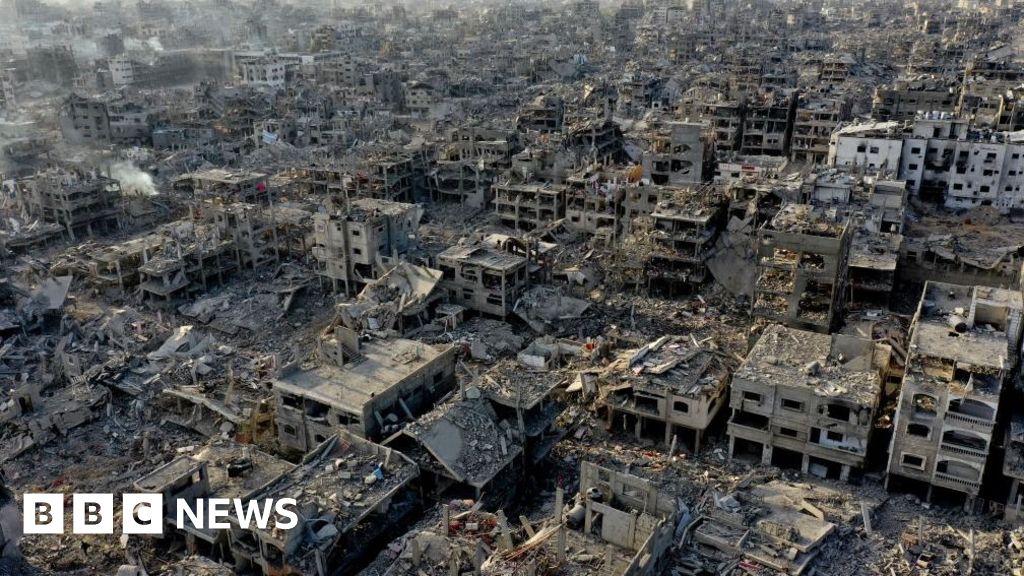
Israeli minister touts Gaza 'real estate bonanza', defying international backlash

Israeli Minister Proposes Gaza as a ‘Real Estate Bonanza’ Amidst International Criticism
In a recent statement that has sparked significant international backlash, Israeli Finance Minister Bezalel Smotrich described the Gaza Strip as a potential “real estate bonanza.” This proclamation comes in the context of ongoing discussions with the United States regarding the future of the territory following the current conflict. Smotrich’s comments reflect a controversial vision for Gaza that has been met with widespread condemnation from various global entities.
A Vision for Gaza’s Future
Speaking at an event in Tel Aviv, Smotrich asserted, “We’ve done the demolition phase… Now we need to build,” referring to the extensive destruction caused by Israel’s military operations in Gaza. He indicated that a business plan related to Gaza’s redevelopment is currently under consideration by former President Donald Trump, suggesting that the U.S. may play a significant role in shaping the territory’s future.
The concept of Gaza as a lucrative investment opportunity was initially floated by Trump earlier this year, who proposed that the U.S. could take a “long-term ownership position” over the region, envisioning it as the “Riviera of the Middle East.” This plan, however, has raised alarms as it implies the forced displacement of Palestinian residents, a move that would contravene international law.
Controversial Plans and International Response
While Smotrich and the Israeli government have described any potential displacement as “voluntary,” the broader international community, including Palestinians and Arab nations, has vehemently rejected these ideas. The White House later appeared to distance itself from Trump’s original proposal, with Trump himself acknowledging in July that the plan was met with mixed reactions.
Despite this, recent reports suggest that a modified version of the proposal is once again on the table. The Washington Post revealed that discussions are ongoing about establishing a trusteeship for Gaza, potentially managed by the U.S. for a decade. This arrangement would aim to transform Gaza into a tourism resort and a hub for high-tech manufacturing, raising further concerns about the implications for the local population.
Humanitarian Crisis in Gaza
The backdrop to these discussions is the severe humanitarian crisis unfolding in Gaza due to the ongoing conflict. Israel’s military campaign, which has included widespread airstrikes and the demolition of buildings, has resulted in catastrophic damage across the region. The United Nations (UN) estimates that 92% of housing units in Gaza have been either damaged or destroyed, and 91% of schools will require extensive reconstruction to return to functionality. Additionally, 86% of agricultural land has suffered damage.
According to the UN, the cost of rebuilding Gaza is projected to reach $53.2 billion over the next decade. The scale of destruction has prompted urgent calls for humanitarian assistance, yet the ongoing violence complicates relief efforts.
Smotrich’s Stance and Political Background
Bezalel Smotrich, a prominent figure in Israel’s far-right political landscape and leader of the Religious Zionist party, has been a vocal advocate for expansionist policies in the region. His past actions have drawn international scrutiny, leading to sanctions from the UK and other nations due to his repeated incitements of violence against Palestinians.
In August, Smotrich unveiled a proposal to annex approximately 80% of the West Bank, asserting that this move aligns with the principle of “maximum land with minimum Arabs.” This stance reflects a broader trend of Israeli settlement expansion in the West Bank and East Jerusalem, territories that Palestinians envision as part of a future state.
Since the 1967 Middle East war, Israel has established around 160 settlements in these areas, housing approximately 700,000 Jewish residents. The settlements are widely regarded as illegal under international law, and their expansion has exacerbated tensions between Israelis and Palestinians.
Ongoing Conflict and Casualties
The current military conflict in Gaza was initiated by a Hamas-led attack on southern Israel on October 7, 2023, which resulted in the deaths of about 1,200 individuals and the abduction of 251 others. In the aftermath, Israeli airstrikes have led to devastating casualties, with Gaza’s health ministry reporting at least 65,062 deaths, nearly half of whom are women and children.
This week, a UN commission of inquiry concluded that Israel’s actions in Gaza may constitute genocide against the Palestinian population, a claim that the Israeli government has strongly denied. The situation remains dire, with international calls for accountability and a resolution to the ongoing violence.
Conclusion
As discussions about Gaza’s future continue, the proposals put forth by Israeli officials, particularly Smotrich, raise profound ethical and legal questions regarding the rights of Palestinians and the potential repercussions of such plans. The international community remains watchful, urging a peaceful resolution to the conflict and a commitment to upholding human rights.
Key Facts
– Bezalel Smotrich, Israel’s Finance Minister, refers to Gaza as a potential “real estate bonanza.”
– Discussions are ongoing with the U.S. about Gaza’s future after the current conflict.
– Donald Trump previously suggested a U.S. “ownership” model for Gaza, envisioning it as a tourism hub.
– The UN estimates that 92% of housing units in Gaza have been damaged or destroyed due to Israeli military actions.
– The projected cost for Gaza’s reconstruction is $53.2 billion over the next decade.
– The ongoing conflict has resulted in over 65,000 Palestinian deaths, with significant casualties among women and children.
Source: www.bbc.com
